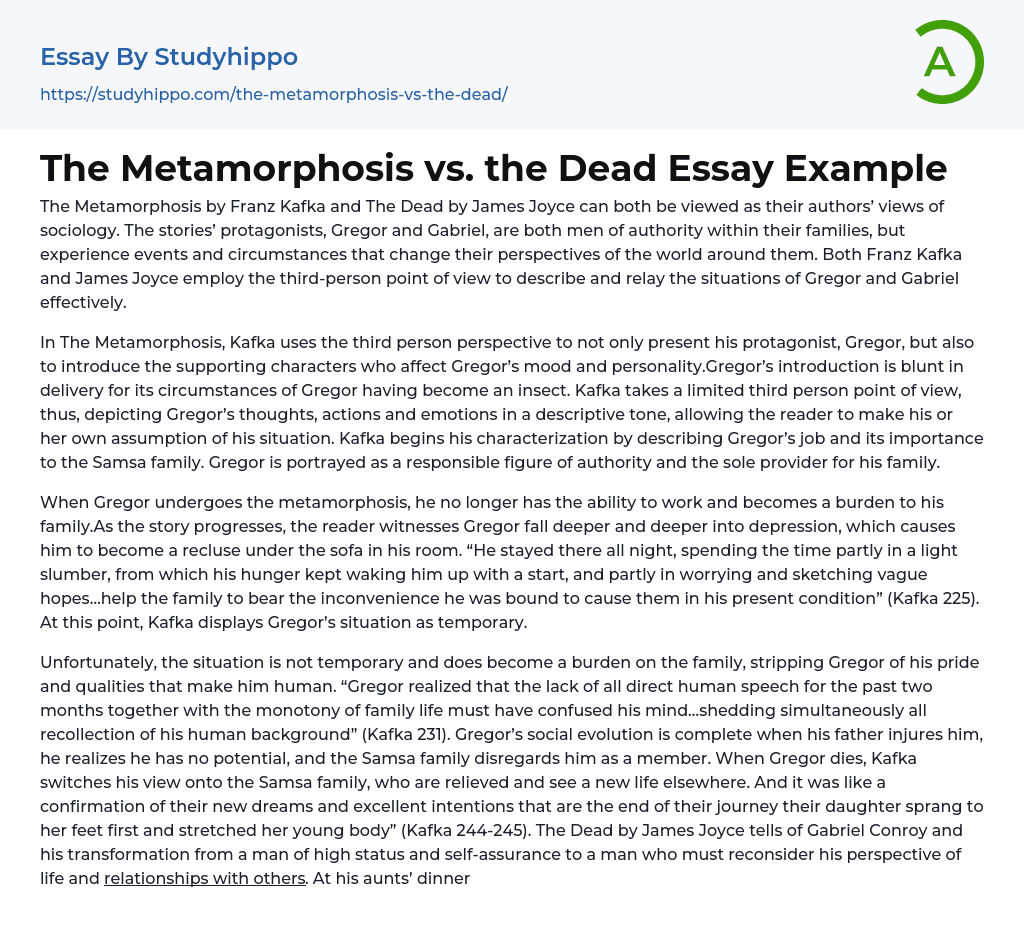Both The Metamorphosis by Franz Kafka and The Dead by James Joyce can be interpreted as depictions of sociology through the perspectives of their respective authors. The male leads, Gregor and Gabriel, hold positions of power within their families, but encounter experiences that shift their perception of the world. Both writers utilize the third-person point of view to effectively convey the events and circumstances surrounding Gregor and Gabriel.
In his work "The Metamorphosis," Kafka employs a third-person perspective to introduce not only the protagonist, Gregor, but also the supporting characters who impact his mood and personality. The introduction of Gregor is delivered bluntly, given that he has transformed into an insect. Kafka uses a limited third-person point of view that describes Gregor's thoughts, actions, and emotions in a descriptive tone, allowing the reader to make their own
...assumptions about his situation. Kafka initially characterizes Gregor by emphasizing the importance of his job to the Samsa family; Gregor is portrayed as a responsible figure of authority and the main provider for his family.
Upon undergoing metamorphosis, Gregor's ability to work disappears and he becomes a burden on his family. As time passes, Gregor sinks deeper into depression and hides under his room's sofa. Kafka writes, "He stayed there all night, spending the time partly in a light slumber...and partly in worrying and sketching vague hopes...help the family to bear the inconvenience he was bound to cause them in his present condition" (225), portraying Gregor's situation as temporary.
Gregor's loss of his human qualities due to the burdensome situation constantly experienced by his family is not temporary, which strips him of his pride according to Kafka (231). Gregor fully realizes
this when his father injures him, thus sealing his fate as a disregarded family member. When he dies, the Samsa family is relieved and joyfully looks to their future elsewhere, as Kafka depicts in his text (244-245). Meanwhile, in James Joyce's "The Dead", protagonist Gabriel Conroy transforms from a confident individual of high status to someone who must reevaluate his perspective and relationships with others, a process highlighted at his aunts' dinner party where Gabriel struggles socially with Lily, the caretaker's daughter (studyhippo.com/franz-kafka-his-relationship-with-his-father-revealed-in-his-writing/).As Gabriel hands his coat to Lily, he tries to engage her in conversation. However, Lily responds sharply when he asks about her love life, causing the interaction to become uncomfortable. To end the exchange, Gabriel offers Lily a substantial tip, but the incident leaves him feeling anxious. Furthermore, Ms. Ivors also takes away his confidence.
According to Joyce's third person point of view, Gabriel becomes flustered and loses confidence after being accused by Miss Ivors. He tries to forget the unpleasant incident but is haunted by her attempts to humiliate him in front of others with her "rabbit's eyes". This characterization suggests that Gabriel is socially awkward and unable to handle criticism. Gabriel's social transformation is completed when his wife Gretta divulges Michael Furey's tragic love for her, which disturbs Gabriel due to its intensity and sad conclusion.
As Gabriel reflects, he becomes aware that his feelings for Gretta did not match the intense passion that Michael Furey had for her. Uncertain about his future, Gabriel struggles with the concept of how to live and cope with the memory of the deceased. In Joyce's words, "His soul swooned slowly as he heard the snow
falling faintly through the universe and faintly falling, like the descent of the last end, upon all the living and the dead" (271). Both Gregor and Gabriel experience epiphanies in their respective stories as they go through transformations that lead to new perspectives on the world.
The use of third person perspectives in the works of Kafka and Joyce creates an impersonal tone and provides insight into the authors' beliefs in contrast to those held by their protagonists. (DiYanni 2007)
The content inside the reads "225-71."
- Allegory essays
- Alliteration essays
- Comedy essays
- Comic book essays
- Drama essays
- Dystopia essays
- Fairy Tale essays
- Fantasy essays
- Fiction essays
- Ghost essays
- Gothic Fiction essays
- Gothic Literature essays
- Irony essays
- Legend essays
- Memoir essays
- Novel essays
- Poetry essays
- Satire essays
- Science Fiction essays
- Short Story essays
- The western essays
- Tragedy essays
- Witchcraft essays
- John Locke essays
- 9/11 essays
- A Good Teacher essays
- A Healthy Diet essays
- A Modest Proposal essays
- A&P essays
- Academic Achievement essays
- Achievement essays
- Achieving goals essays
- Admission essays
- Advantages And Disadvantages Of Internet essays
- Alcoholic drinks essays
- Ammonia essays
- Analytical essays
- Ancient Olympic Games essays
- APA essays
- Arabian Peninsula essays
- Argument essays
- Argumentative essays
- Art essays
- Atlantic Ocean essays
- Auto-ethnography essays
- Autobiography essays
- Ballad essays
- Batman essays
- Binge Eating essays
- Black Power Movement essays




